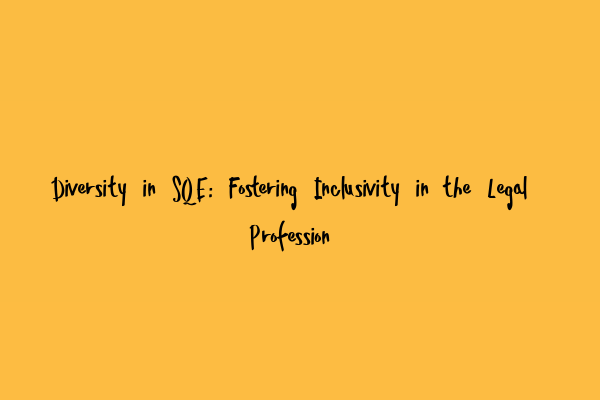Diversity in SQE: Fostering Inclusivity in the Legal Profession
In today’s rapidly evolving legal landscape, the concept of diversity has gained significant attention. As the SQE (Solicitors Qualifying Examination) becomes the standardized route to enter the legal profession, it is crucial to understand and explore the importance of diversity and inclusivity within this new framework.
The Diversity Imperative
Diversity encompasses a wide range of characteristics, including but not limited to race, ethnicity, gender, sexual orientation, age, disability, and socio-economic background. Embracing diversity is not just a moral imperative; it also brings tangible benefits to the legal profession. Research consistently shows that diverse teams lead to better decision-making, increased innovation, and enhanced problem-solving abilities.
The SQE and Diversity
With the SQE set to be the gateway to legal practice in England and Wales, it is essential to ensure that the examination promotes diversity and inclusivity. The examination should not become a barrier for individuals from underrepresented backgrounds to enter the legal profession. Efforts must be made to create a level playing field for all aspiring solicitors.
The SQE will assess candidates based on their knowledge and skills, which is a positive step toward promoting diversity. This shift from the traditional qualification routes, which placed heavy emphasis on prestigious universities and prior legal work experience, allows for a more inclusive approach. Candidates from diverse backgrounds should have equal opportunities to demonstrate their capabilities and succeed.
Addressing Unconscious Bias
Unconscious bias can hinder diversity and inclusivity efforts. To combat this, it is crucial for the SQE examination process to be carefully designed to minimize the impact of bias. The assessment criteria and marking schemes should be scrutinized to eliminate any potential bias and promote a fair evaluation of candidates’ abilities.
Training for examiners and assessors should also include modules on unconscious bias so that they can be aware of and mitigate their own biases. This will ensure a more objective and equitable assessment process.
Outreach Programs
To foster inclusivity, the legal profession as a whole should actively engage in outreach programs. These programs should target schools, colleges, and universities across the country to encourage students from diverse backgrounds to consider a career in law. By providing information, mentorship, and support, aspiring solicitors can be better equipped to navigate the legal education and qualification journey.
Such outreach programs should target underrepresented communities, including individuals from economically disadvantaged backgrounds, minority ethnic groups, and those with disabilities. By actively seeking out talent and offering support, the legal profession can ensure a more diverse and representative cohort of solicitors.
Inclusive Workplace Policies
Inclusivity does not end with the SQE examination. It should extend to the workplace and professional practice. Law firms and legal organizations should adopt inclusive policies and practices that promote diversity at all levels. This includes diversity in recruitment, retention, and promotion processes, as well as creating a supportive and inclusive work environment for all employees.
Training on diversity and inclusivity should be provided to legal professionals to raise awareness and foster a culture of acceptance and respect. By creating inclusive workplaces, the legal profession can attract and retain talent from diverse backgrounds, leading to better representation and increased innovation.
A Forward-Thinking Profession
The SQE represents an opportunity to shape a more diverse and inclusive legal profession. By embracing diversity at all levels, including the examination process, outreach efforts, and workplace policies, the legal profession can become more representative of society and better equipped to meet the evolving needs of clients and communities.
It is crucial that stakeholders, including examination regulators, law firms, legal educators, and aspiring solicitors, work together to champion diversity and inclusivity. By fostering a more inclusive legal profession through the SQE, we can create a future where all individuals, regardless of their background, are given equal opportunities to thrive and succeed.

Leave a Reply